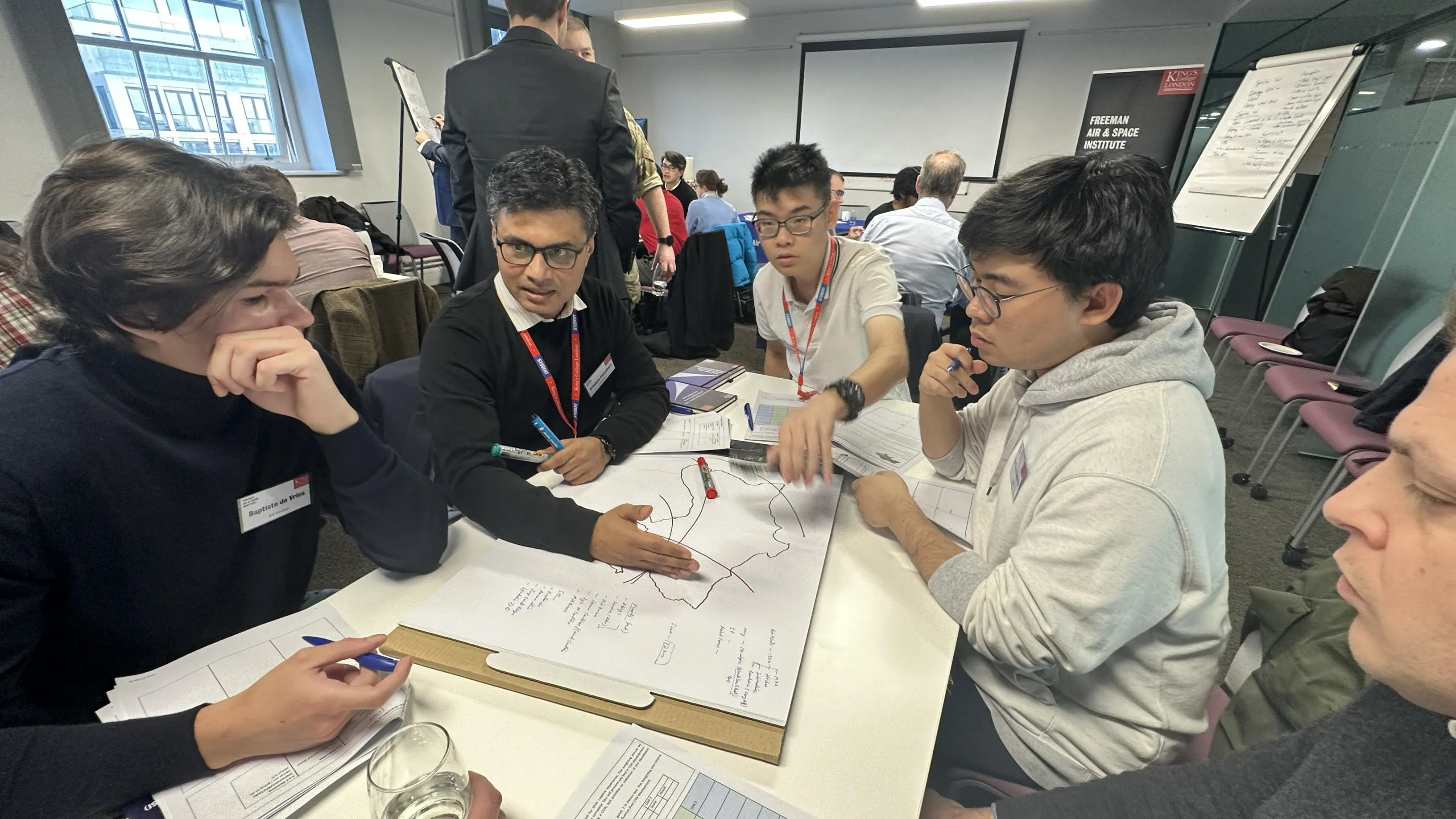There is currently a small footprint of air and space power content in the War Studies undergraduate programme, so organising events such as the Douhet Wargame can be a stepping-stone to raise interest across the student community and improve their understanding of these matters.
Aleix Nadal, PhD Candidate, Freeman Air and Space Institute
12 January 2024
Douhet's Echo: Wargaming Russia's Invasion of Ukraine
Abhinav Poludasu, BA International Relations
The Freeman Air and Space Institute (FASI) hosted the inaugural Douhet Wargame for students from the BA Military Strategy module to raise interest around air and space power issues.

It’s Moscow, December 2021. The tide is not in Russia’s favour. Ukraine’s increasingly pro-Western stance, animated by overtures to NATO and the EU, could lead to Russia’s encirclement by the West and the jeopardising of vital interests. As members of the Russian Air Force, you are to recommend ‘Courses of Action’ (CoAs) necessary to avert such a calamity, using our combat power to coerce Ukrainian society and its armed forces.
This was the task facing participants in the inaugural Douhet Wargame, hosted by the Freeman Air and Space Institute (FASI). Conceived as an interactive learning opportunity for students on the BA Military Strategy module, the wargame, or more precisely, the instructor-led air estimate, was directed by Squadron Leader Colin Bell of the Royal Air Force’s (RAF) Air and Space Warfare Centre.
“One of the core aims of FASI is to cultivate next-generation thinkers on air and space power,” explains FASI PhD candidate Aleix Nadal.
But why Douhet? A pivotal early air strategist, Giulio Douhet is credited with pioneering strategic air power doctrine. His advocacy of novel concepts in aerial warfare and deterrence, which privileged the apocalyptic potential of the air weapon above all else, earned him an enduring and widespread influence on air power theory.
To reconcile Douhet’s ideals with reality, Sqn Ldr Bell subjected each of the four student teams to a different constraint, complicating the development of appropriate CoAs. A senior serving or retired RAF officer probed each team’s thinking. In our case, this was Air Marshal Sean Reynolds (Air Officer Northern Ireland) with whom we had a thought-provoking discussion on the “Centre of Gravity” – in other words, the focal point towards which all military efforts must be directed.
Despite criticism elsewhere of the concept, we felt the Centre of Gravity model spoke to Douhet’s five pivotal target systems: industry, infrastructure, communication lines, government buildings, and the will of the people. The availability of precision munitions prompted us to be specific about which of these would best undermine Ukrainian defences and why, serving in turn as a litmus test for our strategic acumen.
According to Dr John Stone, the convenor of the Military Strategy module: “Douhet does not have all the answers. Nevertheless he provides a valuable lens through which to examine the use of air power in Ukraine.”

In today's complex world, drawing upon the wisdom of past military thinkers in this way fosters a thoughtful and analytical approach to warfare. Wargames, as a supplement to, rather than substitute for, more traditional methods of analysis, can help encourage a meticulous examination of assumptions and biases, providing a nuanced perspective for applying historical lessons to contemporary challenges.
Melvin Leong, a BA War Studies and History student, reflects that “[the wargame] was a riveting experience which hammered in the prescient ideas of Douhet about the importance of strategic air power and how these same concepts can even be applied to similar three-dimensional domains of warfare like space.”
Commenting on his support of an “energetic, thought-provoking and realistic learning experience”, Air Marshal (retd.) Sir Gerry Mayhew felt that he, too, had gained from the exercise: “The scenario and the questions posed seemed to expand everyone’s horizons and we enjoyed mature debate throughout the afternoon.”
All in all, we are grateful to FASI and the RAF for their dedication to cultivating the next generation of thinkers in air and space power. The exercise reminded us about the intricate relationship between theory and practice in contemporary conflict, in turn, shaping our understanding of the complexities involved in applying Douhet’s thinking to modern military strategy.
Abhinav Poludasu is a second-year student on the BA in International Relations.
To keep informed about the latest research, opportunities and events from FASI, subscribe to their mailing list or contact the team at FASI@kcl.ac.uk.

